Huthwaite
Huthwaite is a small village in Nottinghamshire, England, located to the west of Mansfield, close to the Derbyshire border. It is in the Huthwaite and Brierley ward of Sutton-in-Ashfield (West). Before 1907 the village was known as Hucknall-under-Huthwaite and also Dirty Hucknall.[1][2]
| Huthwaite | |
|---|---|
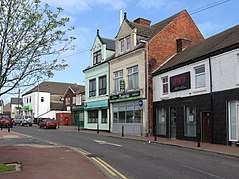 Huthwaite – Market Street | |
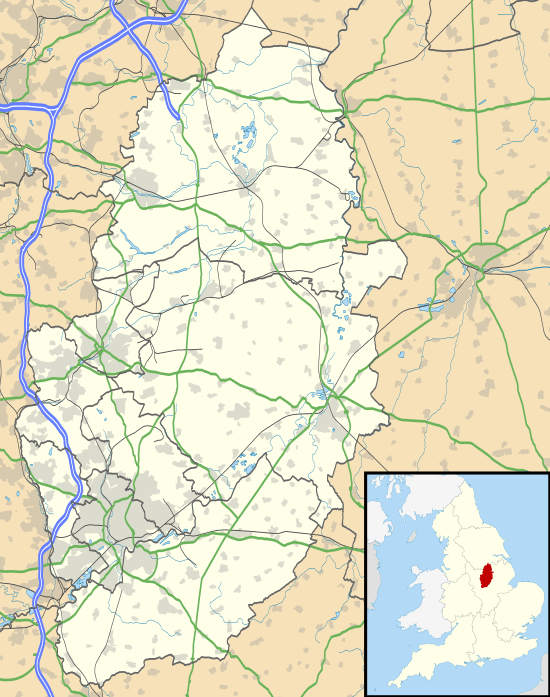 Huthwaite Location within Nottinghamshire | |
| Population | 7,500 |
| OS grid reference | SK468588 |
| District |
|
| Shire county | |
| Region | |
| Country | England |
| Sovereign state | United Kingdom |
| Post town | SUTTON-IN-ASHFIELD |
| Postcode district | NG17 |
| Dialling code | 01623 |
| Police | Nottinghamshire |
| Fire | Nottinghamshire |
| Ambulance | East Midlands |
| UK Parliament | |
Derivation of name
The name Huthwaite is derived from Old English plus Norse elements—hoh is from haugr an Old Norse word for a hill and thwaite means a clearing -so, literally, a clearing on a hill spur. The former Hucknall element refers to Hucca's heath or angle of land and is shared with the present day Hucknall near Nottingham and Ault Hucknall in Derbyshire.
Industry and employment
The population in 1800 was about 500 but soon started to grow with the opening of Hucknall Colliery, a drift mine at the bottom of Blackwell Road. The "Miners Arms" public house is believed to have been the manager's cottage. This mine was worked for around 50 years. It closed due to flooding. In 1877 a new mine called New Hucknall Colliery was opened which employed 500 people. By 1881 the population of the village had grown to over 2000. By 1912 the workforce had increased to over 1,300 but the main industry in the village had become the manufacture of hosiery products.
The closure of the majority of mines in the area, which included New Hucknall Colliery in the early 1980s, and the off shoring of hosiery jobs led to large amounts of unemployment. However today this has been largely rectified.
Shops and services
Huthwaite used to have numerous shops such as groceries, butchers and hardware but in the present day the only major retailers are the local Co-op, Tesco Express and Costcutter, found in the centre of the village. 90% of the other shops are now used as takeaways with cuisine from almost all corners of the earth.[3]
Highest point
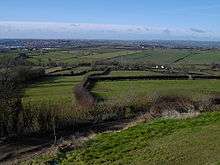
Strawberry Bank (OS grid ref SK4659) is the disputed highest point in Nottinghamshire. It is believed to be the highest natural point at 203m.[4] However, Silverhill (SK4762) a mine spoil-heap on the site of the former Silverhill colliery is higher at 205m.[5] Herrod's Hill in Huthwaite (SK4660), Newtonwood Lane in Whiteborough (SK4560) and Derby Road in Annesley (SK5054) are also contenders for the "highest point in Nottinghamshire" record.[6]
Railway station
There was formerly a railway station situated to the west of the road, just to the north of where the Woodend Inn is currently situated. Initially called "Woodend for Hucknall Huthwaite", the station opened on 1 May 1886 and carried passengers from Sutton-in-Ashfield. In 1893 it was renamed "Whiteborough for Hucknall Huthwaite", and in 1908 the suffix was dropped and the spelling shortened to "Whiteboro Station". On the same day the station in Sutton-in-Ashfield was renamed "Sutton-in-Ashfield for Huthwaite", coinciding with the launch of tram services carrying passengers from Sutton-in-Ashfield.
The station was called Whiteborough after the colliery and nearby fields, the area is known for unknown reasons as "City of Whiteborough", despite being mainly fields and farms.
The station closed on 4 October 1926, however the trams continued until July 1930, before the station closed for good. In common with many former railways in the area, it is now a public footpath. The neighbouring Railway Inn is now called the Woodend Inn.
CWS Hosiery factory
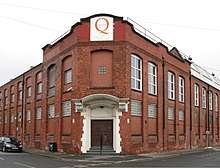
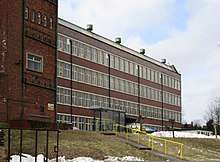
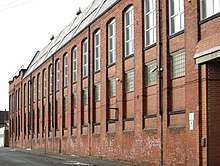
This large factory occupies most of a rectangular site extending about 475 ft north-south along North Street and 350 ft east-west along High Street in Huthwaite. When first built in 1907, it only extended 230 ft along North Street, but was expanded in 1919 further down North Street. Various buildings had been added later, the most recent being the block along the north side of the site. In 1940, the British Royal Navy took over this 4-storey block to be the headquarters of their medical supply department for most of World War II. The architect of the 1907 building was Mr. F.E. Harris of Manchester and the contractor Mr. J. Dickinson of Derby.
The factory was built by the Cooperative Wholesale Society (CWS) for the manufacture of hosiery. It is sometimes referred to as the Belmont Clothing Factory, but "Belmont" may have been a clothing brand name, rather than the name of the building.
When first opened, it was expected to employ 400 people, but probably employed even more in its heyday. It was certainly the major employer of female labour in Huthwaite (New Hucknall Colliery being the major employee of males).
At some point, the hosiery factory became part of the Coats Viyella company. Coats Viyella was once one of the UK's leading textile businesses with retail (Jaeger), thread (Coats) and manufacturing (CV Clothing) businesses. The building is currently occupied by the Quantum Clothing Group. Quantum was created as a management buy-out from Coats Viyella in December 2000 and currently employs around 5000 people worldwide. All the business's UK operations including warehousing, design, development, commercial and finance operated from this site in Huthwaite, together with a small office in Ireland. In July 2012, the Quantum Clothing Group was acquired by Japanese conglomerate Itochu Corp. In April 2015, Ashfield District Council granted planning permission for the "demolition of the existing warehousing and factory complex".[7][8][9][10]
Notable people
- Chris Gascoyne, Coronation Street actor
- Star Slinger DJ / Music Producer
- Andrew Hill (1946–2015), palaeoanthropologist and the J. Clayton Stephenson Professor of Anthropology at Yale University
- Lee Anderson, Current MP for Ashfield
References
- http://huthwaite-online.net/hucknall/
- Mutschmann, Heinrich. The Place-Names of Nottinghamshire: Their Origin and Development (reprint 2012 ed.). Cambridge University Press. p. 71. ISBN 978-1107665415. Retrieved 16 October 2014.
- Oldnotts.co.uk Archived 12 February 2007 at the Wayback Machine
- Haran, Brady (25 June 2004). "Experiencing the highs and lows". BBC News. Retrieved 18 November 2010.
- "Nottinghamshire". Livefortheoutdoors.com. Archived from the original on 24 December 2010. Retrieved 18 November 2010.
- "Geograph discussion thread". www.geograph.org.uk. Retrieved 24 November 2010.
- "Huthwaite CWS Factory". Huthwaite Online. Retrieved 4 April 2013.
- "Huthwaite Nylon Factory". Archives Hub. Retrieved 4 April 2013.
- "Quantum Clothing". Quantum Clothing. Archived from the original on 27 March 2013. Retrieved 4 April 2013.
- "Quantum Clothing Acquired". Knitting Industry. Retrieved 4 April 2013.